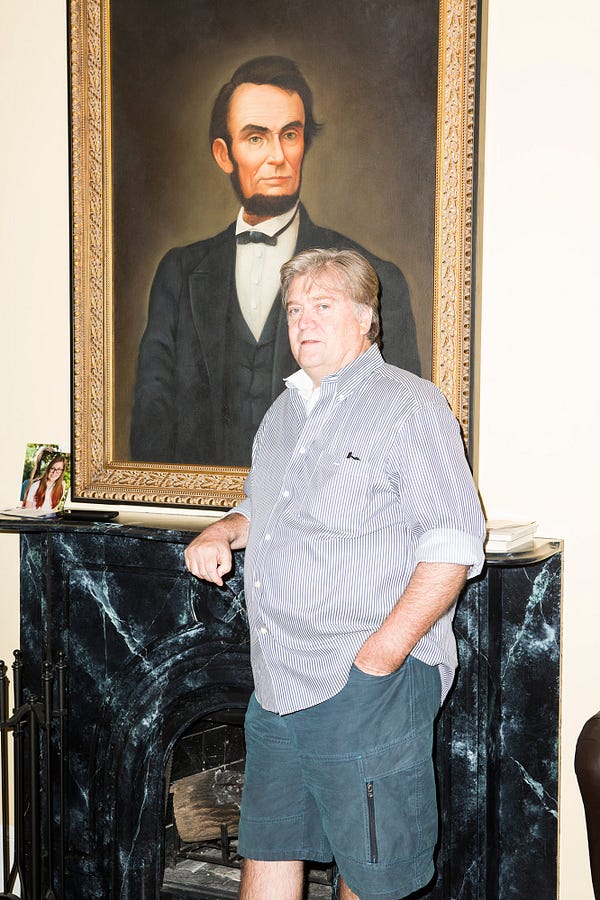
A look at the website that wants to ‘bitch slap’ the GOP.
Welcome to the Glad You Asked series, a shame-free zone where we tackle topics you’re too embarrassed to ask even your BFF about. Don’t worry, we gotchu.
On
Tuesday, far-right provocateur Milo Yiannopoulos resigned from his
editor position at Breitbart News after a conservative blog unearthed video
of him saying that there are certain merits to pedophilia. “I would be
wrong to allow my poor choice of words to detract from my colleagues’
important reporting,” he said in a statement. “So today I am resigning
from Breitbart, effective immediately.”
Yiannopoulos
and Breitbart have been in the news a lot recently, and this
resignation is bound to keep their names trending on Twitter for some
time — so we decided it’s time to explain exactly what Breitbart is and
why you should care.
Breitbart’s Beginnings
Breitbart is a far-right media company that defines itself
as a “conservative news and opinion website” with 45 million readers a
month. It is, far and away, the most popular conservative news outlet in
America. Since getting its start in 2007, Breitbart has forced government officials and congressman from office, brought liberal non-profit groups to their knees, given a platform to America’s most hateful groups and helped get Trump elected to the most powerful office in the Western world.

The
site is headquartered in an unmarked building in LA’s Westside area,
and has bureaus in Texas, London and Jerusalem. It’s supported partly
through advertising revenue and partly by private funders. Breitbart
executives have kept mum about who those private funders are. The hedge fund billionaire Robert Mercer is one. (Mercer’s daughter Rebekah has worked for Trump’s transition team.) But who the others are is anyone’s guess.
A lot of people have criticized Breitbart for encouraging extremism and white supremacy. They point out that the site has an entire section
titled “Black Crime” and that past headlines include “Gay Rights Have
Made Us Dumber, It’s Time To Get Back In The Closet” and “Hoist It High
And Proud: The Confederate Flag Proclaims A Glorious Heritage.”
Breitbart’s editors landed in hot water in May for calling the columnist Bill Kristol “a renegade Jew.”
During
the presidential campaign, the site served as a booster for Trump,
providing more favorable coverage to his campaign than any other major
news outlet. In 2015, anonymous sources at Breitbart, speaking to a
BuzzFeed reporter, alleged
that there was pay-for-play kind of financial relationship between
Trump and the news site. When a female Breitbart reporter said she was assaulted by Trump’s campaign manager at an event in Florida, Breitbart took the Trump campaign’s side, prompting a number of Breitbart reporters and editors to resign in disgust.
None
of this, however, appears to have discouraged the site’s fan base.
While mainstream media organizations have had to lay off reporters and
editors by the dozens, Breitbart continues to break its own traffic records.

Turning the web into an assault rifle
Breitbart
was started in 2007 by the charismatic entrepreneur Andrew Breitbart as
a simple Drudge Report-style news aggregator, pulling in stories
reported by other outlets. Over time though, Breitbard hired journalists
to do original reporting and commentary. He had a deep distrust of both
the mainstream media and politicians, and used Breitbart as a way to “fight bullies,”
no matter what side they were on. As the late New York Times media
columnist David Carr put it: Breitbart “turned the Web into an assault
rifle.”
The
site’s first victim — or the first big one, anyways — was ACORN, an NGO
that advocated for low-income people in communities across the country.
(They helped poor people get access to mortgages and lobbied to raise
the minimum wage, among other things.)
In
2009, a conservative activist — dressed as a pimp — secretly filmed
himself getting advice from ACORN employees about how to set up a
brothel. Breitbart published the videos on its site shortly afterward.
Since ACORN received taxpayer money, the videos ignited a scandal.
Donations to the group nosedived, and it closed the following year.
Breitbart’s
next victim was a Department of Agriculture official named Shirley
Sherrod. The site published a heavily-edited video that seemed to show
Sherrod, who is black, making racist comments about white people at an
NAACP event. The Department of Agriculture fired Sherrod over the video,
then — after reviewing unedited video from the event that showed
Sherrod was actually talking about why racism is bad — apologized. The agency offered Sherrod a new job, which she declined.
But Breitbart’s biggest coup
came in 2011, when it published a bunch of photos of Anthony Weiner, a
liberal Democratic congressman who was gearing up to run for mayor of
New York City. In the photos, Weiner posed half naked and sometimes
fully naked. Breitbart’s reporting alleged that Weiner, who was married
with children at the time, had sent the photos to a number of different
women he’d met online.
Weiner
denied the photos were real, and the press criticized Breitbart for
having published unsubstantiated allegations. When a lewd pic of Weiner
was posted to his public Twitter feed, the narrative began to shift.
Weiner
called a press conference in New York, but was late to arrive. While
the media waited for Weiner to show up, a journalist noticed that Andrew
Breitbart was in the room and urged him to speak. He did — I was there — and
it was incredible to watch. He excoriated the media for not believing
his story, for blindly supporting a perverted politician just because he
was a Democrat, and for outing two of the women involved in the
scandal, whose identities Breitbart had kept hidden to preserve their
privacy. The media hung on his every word. He was theatrical,
pugnacious. And when Weiner finally arrived 20 minutes later and
admitted publicly that he had, in fact, sent all those dick pics, Andrew Breitbart was vindicated. Weiner resigned from office 10 days later.
‘Bitch-slapping’ the GOP
Less than a year after the Weiner scandal, Andrew Breitbart died of a massive heart attack. He was 43 years old.
His death cleared the way for Steve Bannon to take the helm of Breitbart. Bannon — a Gatsbyesque businessman and ultra-conservative political strategist — actually grew up as a Democrat in Virginia, in a “blue-collar, Irish Catholic, pro-Kennedy”
family. But he became disillusioned with the Democratic Party when he
joined the Navy as a young man and “saw how badly Jimmy Carter had
fucked things up” around the world.
Around the time of the 2008 election, Bannon became disillusioned with the Republican Party, too: He told
a Bloomberg reporter in 2015 that “what turned me against the whole
establishment” was returning to the US after living in Asia and seeing
that Bush “had fucked up as badly as Carter.”

That
anti-establishment view made him perfect for Breitbart, which was
beginning to court a slice of American society that was so conservative
it loathed Democrats and Republicans alike. Bannon has said his goal at
Breitbart is to “bitch slap” the GOP, and to “destroy the state … like Lenin” did.
When
he took over Breitbart in 2012, Bannon capitalized on the rage a lot of
low-income white Americans were feeling about Obama’s liberal policies.
It paid off: When Bannon took over, the site had 20 employees and received about 12 million pageviews a month; today, it has 100 staffers and claims to have 16 times as much traffic.
Last year, Bannon took a leave of absence from Breitbart to advise the Trump campaign. He reportedly resigned from Breitbart after Trump won in November in order to work as a chief strategist for the White House.
But
even with Bannon gone, the site is poised to grow more and more. In
Bannon’s wake, Breitbart president and CEO Laurence Solov — an LA lawyer
who’s been on the site’s board of directors since its inception — will
inevitably take on a larger role. Solov told
the Los Angeles Times in January that he wants Breitbart to expand into
TV and to eventually become “a global news network.” The site
reportedly has plans to expand into European countries where anti-immigrant groups have become increasingly influential lately.
Whatever happens, get ready to see a lot more from Breitbart in coming years
BANDARDARAT : AKSES SLOT ONLINE DENGAN KEMUDAHAN DAN KEAMANAN TRANSAKSI
ReplyDeleteNikmati kemudahan dan keamanan akses slot online bersama BANDARDARAT!
Dengan sistem transaksi yang canggih dan terpercaya, Anda dapat melakukan deposit dan withdraw dengan cepat dan aman.
BANDARDARAT menyediakan berbagai pilihan metode pembayaran untuk memudahkan Anda, seperti transfer bank, e-wallet, dan pulsa.
Keamanan data Anda juga terjamin dengan sistem enkripsi terbaru, sehingga Anda dapat bermain dengan tenang tanpa khawatir kebocoran informasi.
Gabung sekarang di BANDARDARAT dan rasakan pengalaman bermain slot online yang nyaman dan aman!